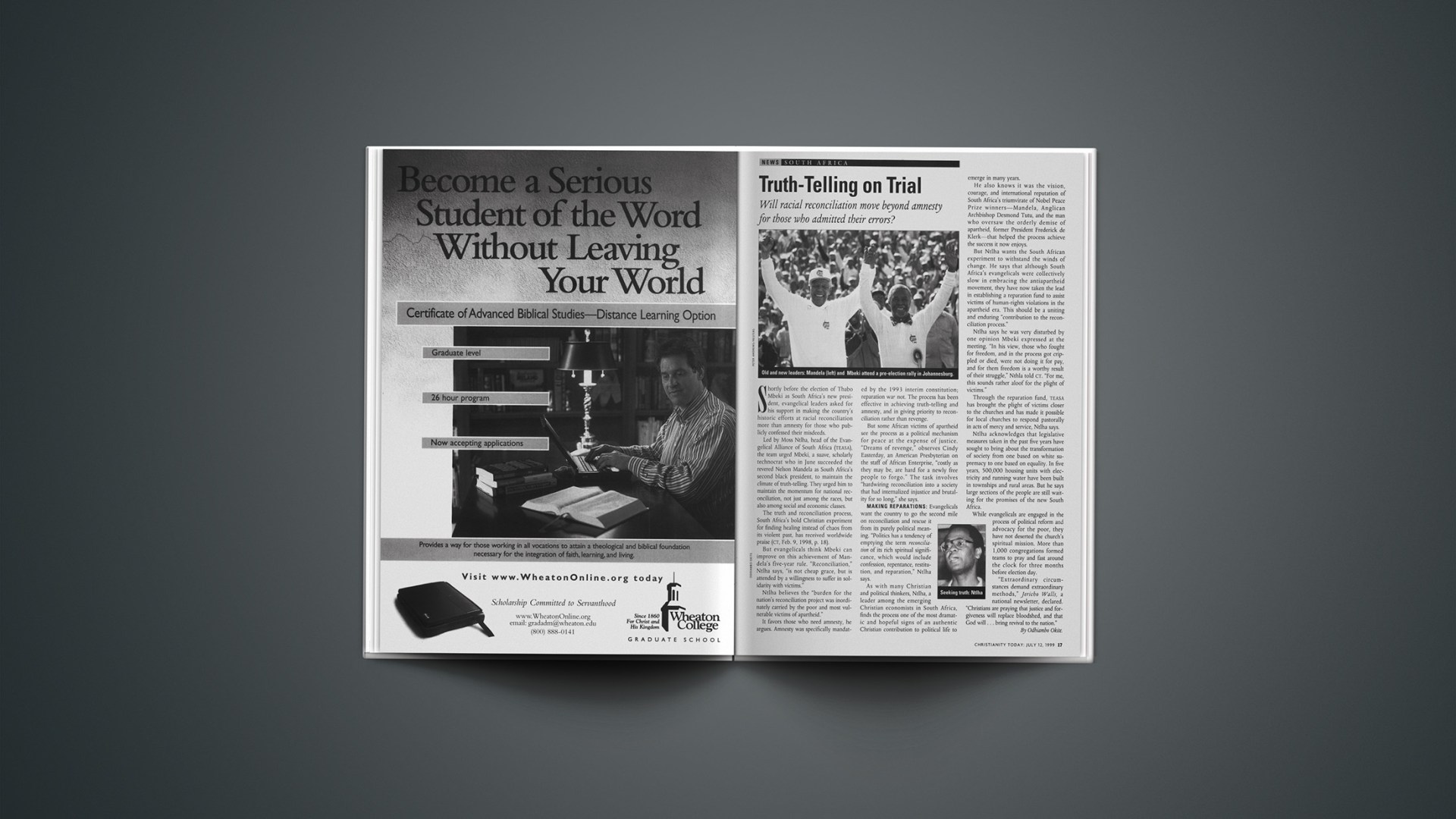Shortly before the election of Thabo Mbeki as South Africa’s new president, evangelical leaders asked for his support in making the country’s historic efforts at racial reconciliation more than amnesty for those who publicly confessed their misdeeds.
Led by Moss Ntlha, head of the Evangelical Alliance of South Africa (TEASA), the team urged Mbeki, a suave, scholarly technocrat who in June succeeded the revered Nelson Mandela as South Africa’s second black president, to maintain the climate of truth-telling. They urged him to maintain the momentum for national reconciliation, not just among the races, but also among social and economic classes.
The truth and reconciliation process, South Africa’s bold Christian experiment for finding healing instead of chaos from its violent past, has received worldwide praise (CT, Feb. 9, 1998, p. 18).
But evangelicals think Mbeki can improve on this achievement of Mandela’s five-year rule. “Reconciliation,” Ntlha says, “is not cheap grace, but is attended by a willingness to suffer in solidarity with victims.”
Ntlha believes the “burden for the nation’s reconciliation project was inordinately carried by the poor and most vulnerable victims of apartheid.”
It favors those who need amnesty, he argues. Amnesty was specifically mandated by the 1993 interim constitution; reparation was not. The process has been effective in achieving truth-telling and amnesty, and in giving priority to reconciliation rather than revenge.
But some African victims of apartheid see the process as a political mechanism for peace at the expense of justice. “Dreams of revenge,” observes Cindy Easterday, an American Presbyterian on the staff of African Enterprise, “costly as they may be, are hard for a newly free people to forgo.” The task involves “hardwiring reconciliation into a society that had internalized injustice and brutality for so long,” she says.
MAKING REPARATIONS: Evangelicals want the country to go the second mile on reconciliation and rescue it from its purely political meaning. “Politics has a tendency of emptying the term reconciliation of its rich spiritual significance, which would include confession, repentance, restitution, and reparation,” Ntlha says.
As with many Christian and political thinkers, Ntlha, a leader among the emerging Christian economists in South Africa, finds the process one of the most dramatic and hopeful signs of an au then tic Christian contribution to political life to emerge in many years.
He also knows it was the vision, courage, and international reputation of South Africa’s triumvirate of Nobel Peace Prize winners—Mandela, Anglican Archbishop Desmond Tutu, and the man who oversaw the orderly demise of apartheid, former President Frederick de Klerk—that helped the process achieve the success it now enjoys.
But Ntlha wants the South African experiment to withstand the winds of change. He says that although South Africa’s evangelicals were collectively slow in embracing the antiapartheid movement, they have now taken the lead in establishing a reparation fund to assist victims of human-rights violations in the apartheid era. This should be a uniting and enduring “contribution to the reconciliation process.”
Ntlha says he was very disturbed by one opinion Mbeki expressed at the meeting. “In his view, those who fought for freedom, and in the process got crippled or died, were not doing it for pay, and for them freedom is a worthy result of their struggle,” Nthla told CT. “For me, this sounds rather aloof for the plight of victims.”
Through the reparation fund, TEASA has brought the plight of victims closer to the churches and has made it possible for local churches to respond pastorally in acts of mercy and service, Ntlha says.
Ntlha acknowledges that legislative measures taken in the past five years have sought to bring about the transformation of society from one based on white supremacy to one based on equality. In five years, 500,000 housing units with electricity and running water have been built in townships and rural areas. But he says large sections of the people are still waiting for the promises of the new South Africa.
While evangelicals are engaged in the process of political reform and advocacy for the poor, they have not deserted the church’s spiritual mission. More than 1,000 congregations formed teams to pray and fast around the clock for three months before election day.
“Extraordinary circumstances demand extraordinary methods,” Jericho Walls, a national newsletter, declared. “Christians are praying that justice and forgiveness will replace bloodshed, and that God will … bring revival to the nation.”
Copyright © 1999 Christianity Today. Click for reprint information.










